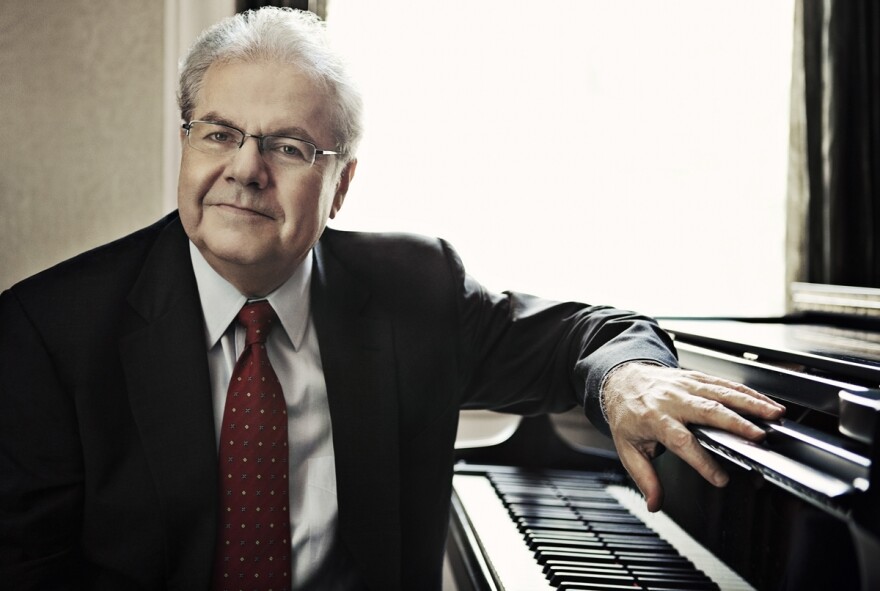Join us on Sunday, Oct. 29 at 1 p.m. on WRTI 90.1 and Monday, Oct. 30 at 7 p.m. on WRTI HD-2 as The Philadelphia Orchestra in Concert brings you an encore presentation of Mozart’s Piano Concerto No. 18 and Bruckner’s Symphony No. 4. Herbert Blomstedt, a legendary conductor still remarkably energetic in his mid-90s, is on the podium.

Pianist Emanuel Ax, a favorite with Philadelphia audiences, is featured in Mozart’s concerto, written in a period of intense creativity and performance activity. After a childhood spent touring Europe as a prodigy, Mozart moved to Vienna at 25 to establish himself as a composer. A series of piano concertos gave him his greatest public successes in the capital. He wrote 12 of these concertos in a two-year period, and performed them at public concerts, displaying his formidable gifts as a composer, soloist, and orchestra leader. The Concerto No. 18 in B-flat major was initially intended for Mozart’s friend, the blind pianist Maria Theresia von Paradis. She is thought to have played it on tour in 1784, though the date of its premiere is uncertain. What is known is that Mozart himself played the concerto in February 1785 in the presence of the Emperor, who showed his appreciation with hearty bravos.
For the concertos Mozart himself premiered, no cadenzas have survived, because the composer improvised them in performance. But when he wrote for other pianists, Mozart composed written cadenzas for their use. While some pianists have composed their own cadenzas for this work, Emanuel Ax plays Mozart’s originals.
The program concludes with a monumental work by Anton Bruckner: His Fourth Symphony in E-flat major, which he called his “Romantic” Symphony. Given Bruckner’s outsized impact on the development of the symphonic form, his musical beginnings were relatively modest. He was a renowned organist, but didn’t begin composing in earnest until his late 30s, and didn’t achieve public success with any of his symphonies until the Fourth Symphony premiered in 1881, when he was 56. At the time, the Viennese musical elite regarded Bruckner as a quiet, humble, and even self-effacing personality. But his symphonies reveal a different musical nature. He was a bold innovator who expanded the symphonic form to ambitious proportions, enlivened by rich harmonies and imaginative orchestration.
The Fourth Symphony shows these merits in abundance, unfolding with a leisurely breadth and grandeur. Bruckner was inspired by the idea of a medieval hunt, and echoes of this inspiration can be heard through most of the Fourth Symphony. The first movement opens with a nocturnal string tremolo. Sunrise appears with the entry of a solo horn. As the hunt gets underway, knights on horseback proceed through pastoral landscapes, where birds sing and peasants dance. The slow second movement was described variously by the composer as a prayer, a serenade, and a song — and there are elements of all three. An energetic Hunting Scherzo forms the third movement. The finale seems to depart from the hunt. Though an early version of the symphony cast this fourth movement as a folk festival, the composer reworked its material before the premiere to such an extent that it follows no clear program. Nevertheless, it is a movement of drama and grandeur, concluding with a magnificent coda.
PROGRAM:
Mozart: Piano Concerto in B-flat major, K. 456
Bruckner: Symphony No. 4 in E-flat major
The Philadelphia Orchestra
Herbert Blomstedt, conductor
Emanuel Ax, piano
WRTI PRODUCTION TEAM:
Melinda Whiting: Host
Alex Ariff: Senior Producer
Susan Lewis: Consulting Producer
Joseph Patti: Broadcast Engineer
Listen to The Philadelphia Orchestra in Concert broadcasts every Sunday at 1 p.m. on WRTI 90.1, streaming at WRTI.org, on the WRTI mobile app, and on your smart speaker. Listen again on Mondays at 7 p.m. on WRTI HD-2. Listen for up to two weeks after broadcast on WRTI Replay.


